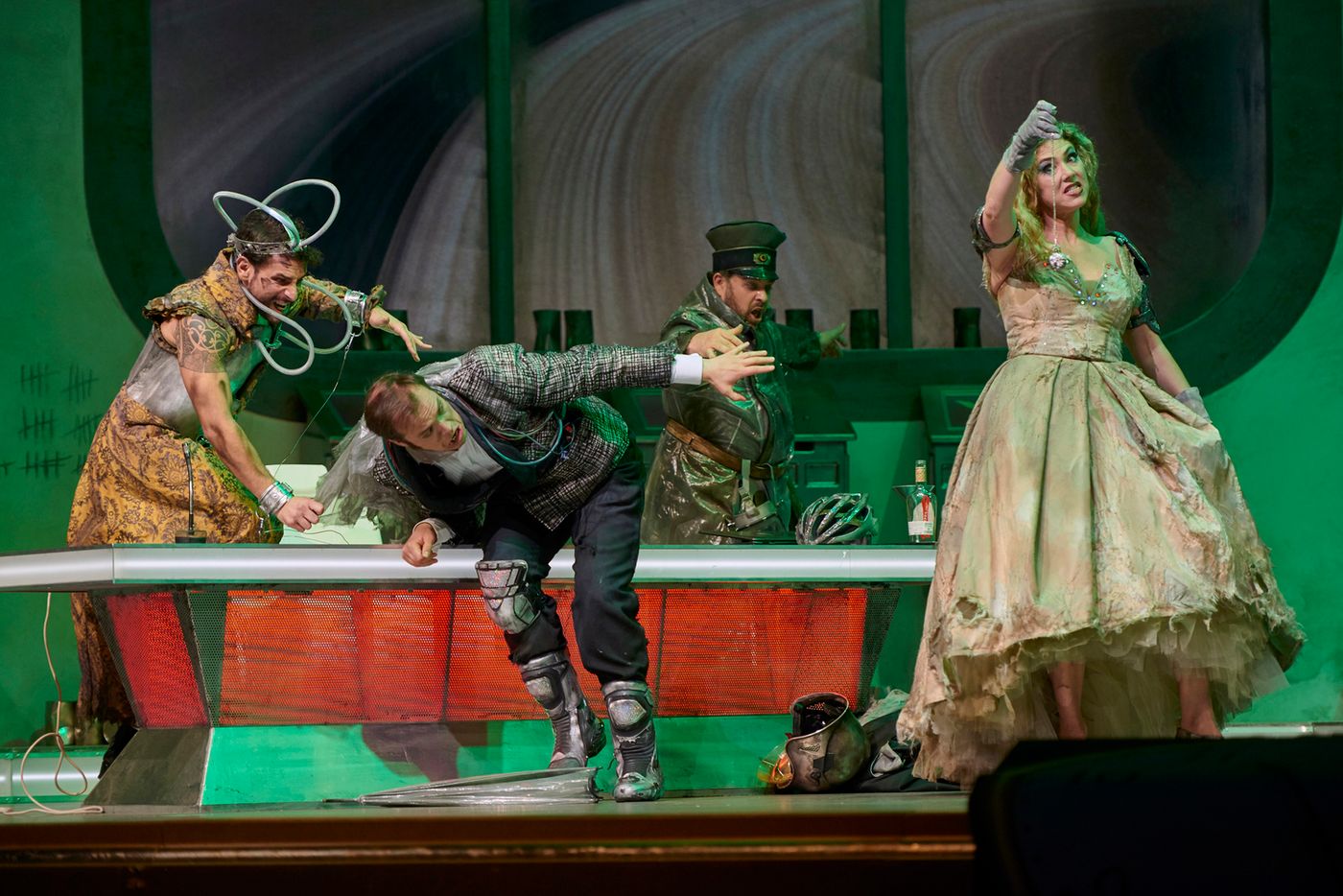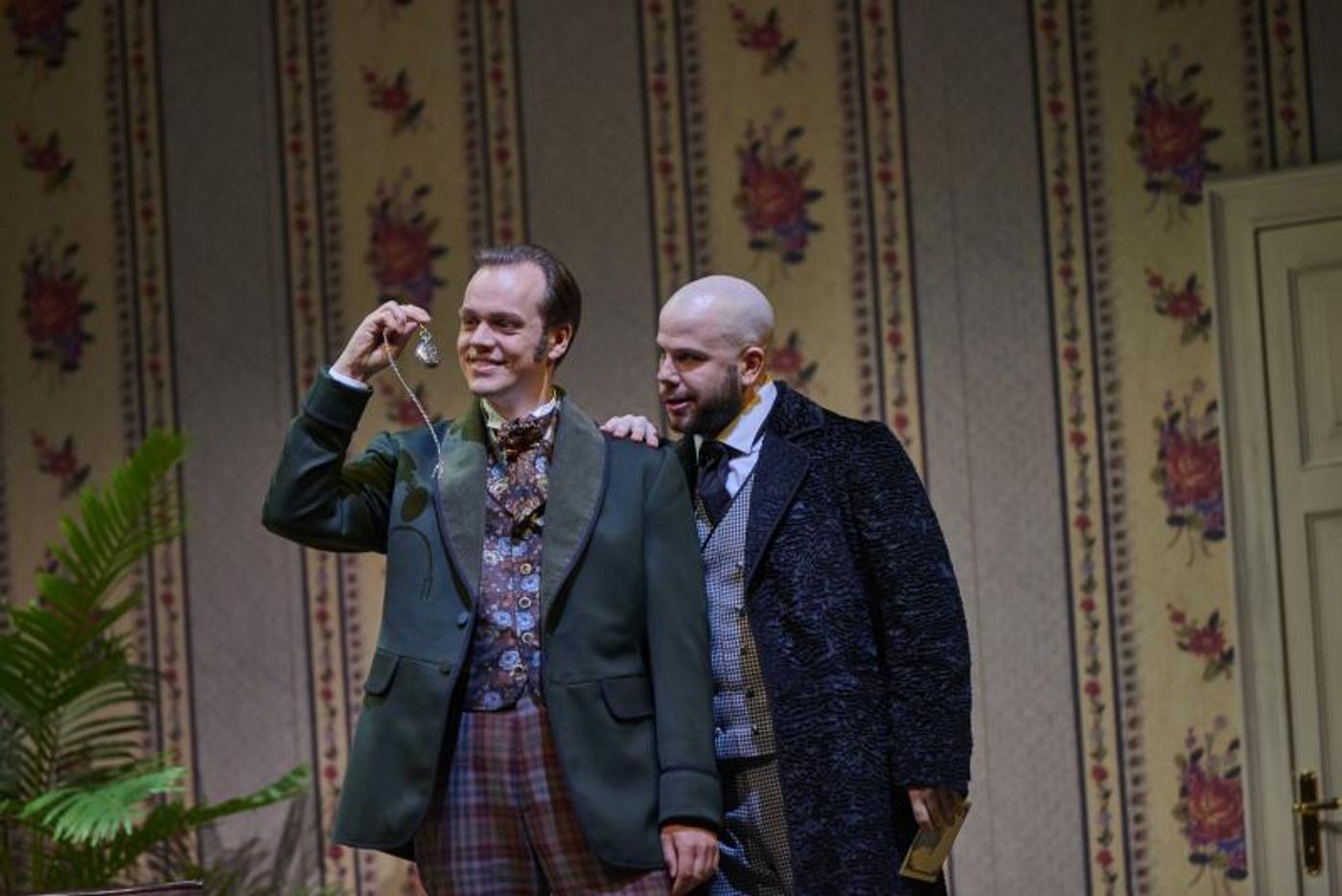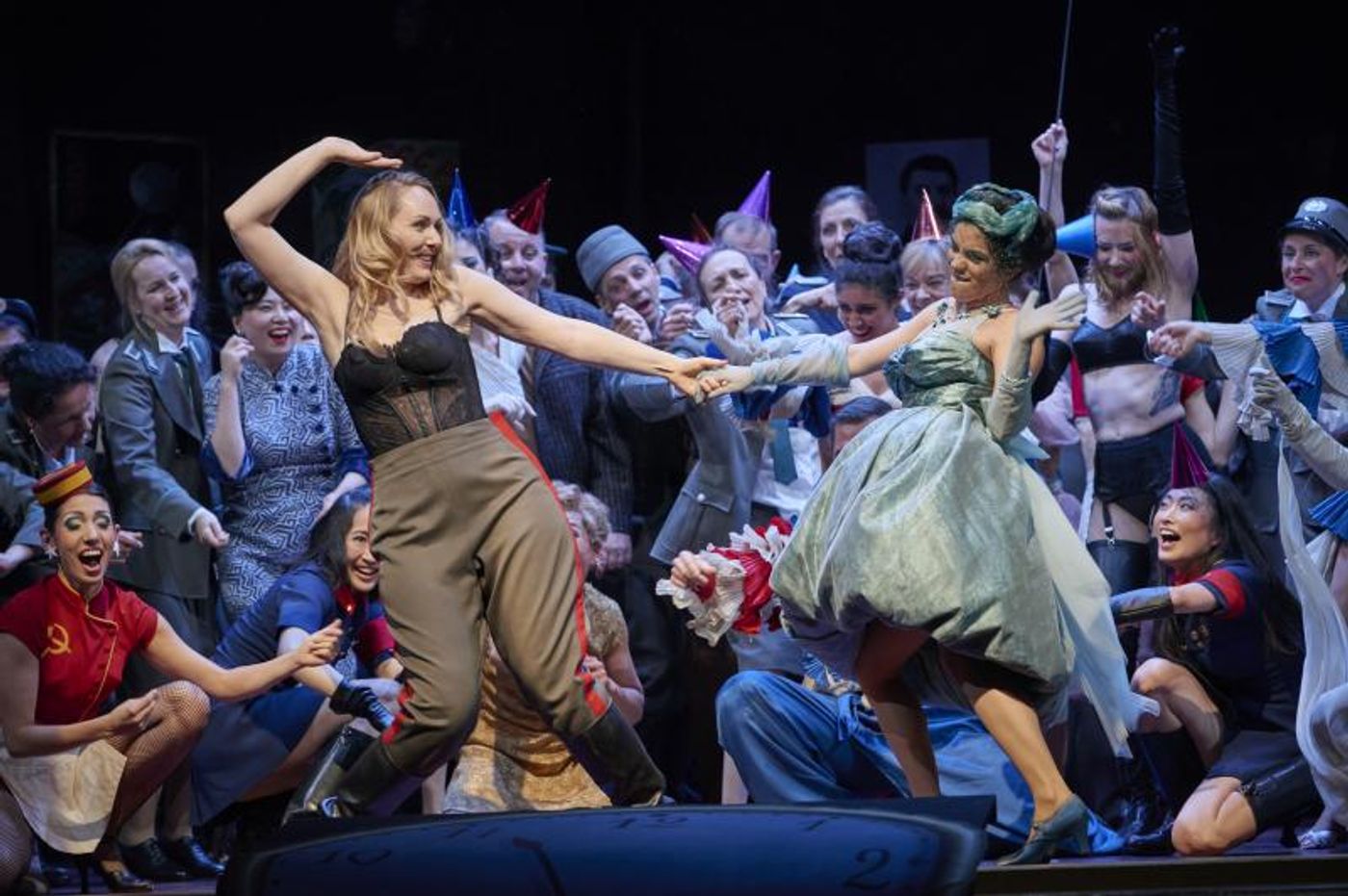Review: DIE FLEDERMAUS at Deutsche Oper Berlin - An ABC Production (an Amateurish, Boring Catastrophe) directed by former operatic tenor, Rolando Villazón
 If you let a chimpanzee drive a speeding locomotive, you'd get a train wreck similar to DIE FLEDERMAUS at Deutsche Oper Berlin. Former operatic tenor, Rolando Villazón is responsible for "directing" this unmitigated disaster of a very expensive new production. Were I not on assignment to review FLEDERMAUS for Broadwayworld.com, I would have left after the first 20 minutes of Act One.
If you let a chimpanzee drive a speeding locomotive, you'd get a train wreck similar to DIE FLEDERMAUS at Deutsche Oper Berlin. Former operatic tenor, Rolando Villazón is responsible for "directing" this unmitigated disaster of a very expensive new production. Were I not on assignment to review FLEDERMAUS for Broadwayworld.com, I would have left after the first 20 minutes of Act One.
Sitting in the audience last night, once again I was stunned at the complete disconnect between the musical and theatrical values in this theater. Donald Runnicles, General Music Director of the theater conducted the marvelous Deutsche Oper Orchestra with great precision and aplomb. When the Overture began, one relaxed into a sonorous cloud of Strauss' Waltz Melodies. For my taste, Mr. Runnicles could have easily added another helping of Viennese "Schmalz" to the mix, but the orchestra's performance was, as always, magnificent. Then, unfortunately, the curtain went up.
Before giving Mr. Villazón a well-deserved critical lashing, I want to commend the singers and chorus of this production. As I have witnessed at numerous productions in this house, despite the inanity of what is being required of them, all the performers do their very best to fulfill their "director's vision." Whatever stupidity is thrust into their paths, the performers give it their all. However noble their artistic suffering, in my opinion, a mutiny from the onstage performers would better serve both the intentions of the creators of these masterpieces and the interests of the Deutsche Oper Berlin's much put-upon audience. One can only hope....

Thomas Blondelle, as Eisenstein sang with assuredness and excellent diction. Of all the performers, he found a strategy to supersede the asininity of the direction and still deliver a believable character with a light sense of absurdity that was often very funny. Bravo.
Annette Dasch as Rosalinde sang remarkably well given the circumstances. During the second act Csárdás - "Klänge der Heimat," the most difficult aria in the show, Ms. Dasch was forced to jump, spring and bend herself into aerobic gymnastic positions that served neither the lyrics, the music, nor her singing. That she acquitted herself as well as she did is a tribute to her discipline and vocal technique. One would have thought that Mr. Villazón, once a tenor of international reputation, would have had better judgment and exercised a bit of restraint. Forget it. Time and again, Mr. Villazón required the most unnecessary and difficult stage movements just before his singers had to hit their highest notes or sing their most difficult phrases. That one performer would do that to another, is unconscionable.

Angela Brower as the Prince from Orlofski had a melting mezzo-soprano and perfect intonation. Her "Ich lade mir gerne Gäste ein" was gorgeously sung. One longed to hear more from her. As Adele, Nicole Haslett is a young soprano with great possibilities. Her voice was somewhat underpowered in this large theater, but given time, and a good director, she will be a formidable stage performer. Enea Scala as Alfredo served as a "stand in" for the manic performances for which Mr. Villazón was formerly known. His tenor, despite some thickness in his middle voice, has ringing high notes, and vocally, he shows promise. His acting and his German both leave much to be desired. Rather than serving as a romantic foil for Rosalinde, in this production, Alfred seemed more a singing savant with ADD. Florian Teichtmeister, as "Cyborg Frosh" in a futuristic Act 3, was truly comic in the best sense of the word.
The old saying goes "Drama is easy. Comedy is hard." In contrast to sung-through dramatic operas, operettas, as the forerunner to musicals, have long passages of spoken dialogue. If one is going to direct an operetta, an acute sense of character and character development, as well as a feel for comedic timing, are prerequisites. Watching well-defined characters react to unusual situations is the essence of good comedy. Five minutes after the start of Act One, it was painfully obvious that Mr. Villazón had absolutely no idea of what he was doing. In Deutsche Oper's FLEDERMAUS, character development was non-existent and as such, the audience didn't care about the persons onstage. Every joke fell flat. The pauses in the dialogues were endless causing the first act to seem as long as a millennium. Instead of laughing and applause, there was yawning and silence in the audience. There was no sense of history or connection between the characters onstage at all. Mr. Villazón's staging was rudimentary at best, and frenzied at its worst.
His decision to set each act in a different time period was ludicrous and was countermanded time and again by Strauß' eternal melodies. The second act, instead of being a Masked Ball, was, for some unknown reason, set in a nightclub in 1950s East Berlin. Instead of serving the music or telling a coherent story, Mr. Villazón rather populated the stage with a plethora of archetypes and symbols that one sees in every "Regietheater" production throughout Europe. With God as my witness, if I live to be 100 years old, I never, ever want to see another Nazi, Drag Queen, S&M Dominatrix, Homeless Person, Cuban Samba Dancer, or Chinese Red Army Officer onstage in DIE FLEDERMAUS or any other operetta ever again. The above may sound interesting, but it was not. The audience sat slack-jawed watching a ridiculous, messy grotesque of a spectacle that lacked both humor and focus and which had no place in the show at hand. During a three-hour performance, there was seldom applause and even fewer laughs from the audience and this, in an operetta with well-known, and well-loved songs and banter.
The performance last night had nothing to do with DIE FLEDERMAUS. I pity the young members of the audience who were being exposed to an operetta for the first time. I pity the audiences who, hope against hope, show up time and again looking for entertainment, and leave the theater bored and disappointed from what they have witnessed. I pity Johann Strauß who must be turning over in his grave at the indignities foisted upon his great work by Mr. Villazón. Most of all, I pity the poor performers who were subjected to directorial incompetence of this magnitude in an A-Level house like the Deutsche Oper Berlin.
If one is going to "update" a piece of the classical repertoire, one has to find analogies to the new time period that still allow the social- and economic- differences of the characters to be explored. Rather than having a thoroughly thought-through concept, Mr. Villazón's method of directing simply "threw mountains of spaghetti against a wall to see what stuck." Just like the aforementioned misuse of semolina, DIE FLEDERMAUS was a mess. During the premiere of this production, Mr. Villazón's curtain call was met with well-deserved boos. Whatever talents he may possess, he has no more business directing operas or operettas than a chimpanzee has driving a high-speed train.
Reader Reviews
Videos


